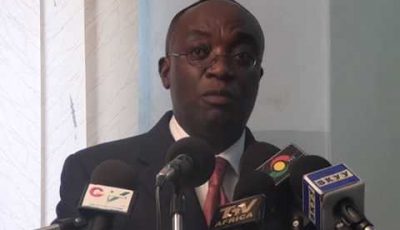Warning: Undefined array key "dirname" in /home/anapuafm/public_html/wp-content/themes/anapuafm/include/plugin/filosofo-image/filosofo-custom-image-sizes.php on line 133
Warning: Undefined array key "extension" in /home/anapuafm/public_html/wp-content/themes/anapuafm/include/plugin/filosofo-image/filosofo-custom-image-sizes.php on line 134
New driver’s licence, vehicle registration card launched
A new smart driver’s licence and new vehicle registration smart card issued by the Driver and Vehicle Licensing Authority (DVLA) have been launched in Accra.
The new licence contains a chip loaded with the owner’s bio-data and the driver’s personal information.
The two smart cards will facilitate the activities of the DVLA and improve its service delivery to the public.
Applicants of the new licence are expected to receive it within two to three weeks, with premium applications getting their licence on the same day.
The introduction of the two has been met with opposition from some driver unions and groups the DVLA suspects to be middlemen.
That notwithstanding, the authority is hopeful that the launch will do away with fake licences and vehicles with fake roadworthy certificates in the system, as well as cut out middlemen, popularly known as ‘goro boys’, from the licensing regime.
Technology
According to the DVLA, the new licence had made use of the latest technology for secure identification and printing and it could easily be integrated with other systems, including the National Identification Authority, the Passport Office and Social Security, with improved guarantee for securing data and card.
To make registration easy and paperless, the DVLA system has been connected to the GCNet system, making it easy to use the chassis numbers of vehicles to track the custom and import documentations.
The printing of the licences will not be outsourced, as the DVLA has now acquired its own printing machines.
The authority has also developed an online database that automatically allows the transmission of all vehicles registered and new driver’s licences.
Improved service delivery
Performing the launch, the Vice-President, Dr Mahamudu Bawumia, said the two smart cards would facilitate the activities at the DVLA and improve its service delivery to the public.
With the new process that had been put in place at the DVLA with the two smart cards, “it means that practically it should take anybody a maximum of two to three weeks to obtain a licence in Ghana. And once you’ve passed your test, if you opt for the premium service, you should get your licence in one day”.
Dr Bawumia said that was remarkable progress.
He said it was the desire and vision of the government that following the introduction of the cards, the DVLA would continue to leverage on technology to help place Ghana as the best destination for doing business.
The Vice-President said the DVLA had accordingly been charged to ensure constant innovation in its operations, so that the Ghanaian or foreigner who was eligible to drive or wanted to register his or her vehicle would do so under optimal conditions.
“I am looking forward to an effective, efficient and sustainable DVLA in the months ahead,” he charged.
Dr Bawumia stressed that President Akufo-Addo was really determined to improve the economy, for which reason he had introduced a number of measures, including the national identification card, the paperless port, the digital public procurement system and the national digital property address system
“All these initiatives, at the instance and direction of the President, are expected to operate collaboratively to ensure that Ghana becomes the preferred place of doing business in Africa,” he said.
Other speakers
Earlier, the Chief Executive Officer of the DVLA, Mr Kwasi Agyeman Busia, had said the lack of a robust secure driver’s licence and a compromised roadworthy certificate had contributed to uncertified drivers and vehicles on the roads and that posed a threat to national security.
He said the launch of the cards, therefore, marked the introduction of a high security driver’s licence and the digitisation of all vehicle records which enabled the absolute link between owner and vehicle, as the new secure licence created the identity of a certified driver.
Concerning the opposition from some driver unions towards the two DVLA systems, the Minister of Transport, Mr Kwaku Ofori Asiamah, urged the public, especially drivers, to support the initiative by avoiding the services of middlemen and rather deal directly with DVLA staff for genuine smart cards.
“The DVLA has been instrumental, over the years, in the discharge of its duties. However, its efforts have been dented by a number of activities, including those of middlemen who issue fake licences and vehicle registration documents to clients,” he said.
The reform, he said, was, therefore, to eliminate the cumbersome nature of the process.
The Chairman of the Council of State, Nana Otuo Siriboe, who chaired the launch, urged the DVLA not to allow the “good-intentioned” system to be a means of frustrating the public when quality service was to be delivered in a timely fashion.
The Executive Director of the National Road Safety Commission, Mrs May Obiri-Yeboah, was full of praise for an additional feature of the new driver’s licence which ensured that a particular driver should drive an automatic vehicle only, as well as persons who should be driving with the aid of medicated glasses.
From a metal badge issued in the Gold Coast in 1944, Ghana has seen four other licences, the last one being 10 years ago. They are a handwritten version in 1956, the wine card in 2000, a PVC in 2007 and the new smart card.
Source: Graphic




